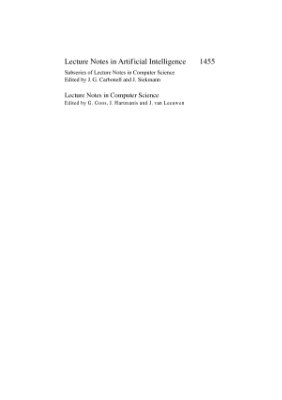Издательство Springer, 1998, -480 pp.
Managing uncertainty is one of the key questions in a diverse range of areas in computing. Many researchers in both universities and commercial organizations are seeking better information on applying uncertainty formalisms. There is a particular need for analyses comparing and contrasting different approaches to uncertainty formalisms and we hope that the papers in this book help to fill this need.
The papers are divided into three sections:
— Papers in the first section outline some of the general problems being considered by researchers and introduce some of the range of uncertainty formalisms being proposed as the basis of solutions.
— Papers in the second section are case studies in applying uncertainty formalisms. Each paper in this category has a well-delineated application problem and an analysed solution based on an uncertainty formalism.
— Papers in the third section report on developments of uncertainty formalisms and supporting technology—such as automated reasoning systems—that are vital for making uncertainty formalisms applicable.
We believe that there is considerable synergy between the papers in this book. Furthermore, we believe that the critical mass of case studies and associated material should make this book a particularly important resource.
Section A: Introduction
Introduction to uncertainty formalisms
A review of uncertainty handling formalisms
Section B: Application case studies
Using uncertainty management techniques in medical therapy planning: A decision-theoretic approach
An ordinal approach to the processing of fuzzy queries with flexible quantifiers
Using uncertainty techniques in radio communication systems
Handling imperfect knowledge handling in Milord II for the identification of marine sponges
Qualitative risk assessment fulfils a need
Information retrieval and Dempster-Shafer's theory of evidence
Uncertainty measures associated with fuzzy rules for connection admission control in ATM Networks
Handling uncertainty in control of autonmous robots
Some problems in trying to implement uncertainty techniques in automated inspection
Correlation using uncertain and temporal information
Arguing about beliefs and actions
Analysis of multi-interpretable ecological monitoring information
Section C: Technology for applications
A local handling of inconsistent knowledge and default bases
The XRay system: An implementation platform for local query-answering in default logics
Model-based diagnosis: A probabilistic extension
Background to and perspectives on possibilistic graphical models
How much does an agent believe: An extension of modal epistemic logic
Safety logics
Modelling uncertainty with propositional assumption-based systems
Managing uncertainty is one of the key questions in a diverse range of areas in computing. Many researchers in both universities and commercial organizations are seeking better information on applying uncertainty formalisms. There is a particular need for analyses comparing and contrasting different approaches to uncertainty formalisms and we hope that the papers in this book help to fill this need.
The papers are divided into three sections:
— Papers in the first section outline some of the general problems being considered by researchers and introduce some of the range of uncertainty formalisms being proposed as the basis of solutions.
— Papers in the second section are case studies in applying uncertainty formalisms. Each paper in this category has a well-delineated application problem and an analysed solution based on an uncertainty formalism.
— Papers in the third section report on developments of uncertainty formalisms and supporting technology—such as automated reasoning systems—that are vital for making uncertainty formalisms applicable.
We believe that there is considerable synergy between the papers in this book. Furthermore, we believe that the critical mass of case studies and associated material should make this book a particularly important resource.
Section A: Introduction
Introduction to uncertainty formalisms
A review of uncertainty handling formalisms
Section B: Application case studies
Using uncertainty management techniques in medical therapy planning: A decision-theoretic approach
An ordinal approach to the processing of fuzzy queries with flexible quantifiers
Using uncertainty techniques in radio communication systems
Handling imperfect knowledge handling in Milord II for the identification of marine sponges
Qualitative risk assessment fulfils a need
Information retrieval and Dempster-Shafer's theory of evidence
Uncertainty measures associated with fuzzy rules for connection admission control in ATM Networks
Handling uncertainty in control of autonmous robots
Some problems in trying to implement uncertainty techniques in automated inspection
Correlation using uncertain and temporal information
Arguing about beliefs and actions
Analysis of multi-interpretable ecological monitoring information
Section C: Technology for applications
A local handling of inconsistent knowledge and default bases
The XRay system: An implementation platform for local query-answering in default logics
Model-based diagnosis: A probabilistic extension
Background to and perspectives on possibilistic graphical models
How much does an agent believe: An extension of modal epistemic logic
Safety logics
Modelling uncertainty with propositional assumption-based systems

